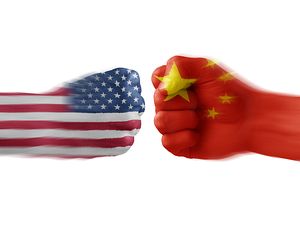The Council on Foreign Relations has produced a new report arguing that the United States needs a new grand strategy vis-à-vis China. Specifically, the United States must adapt its policy from “continuing to assist [China’s] ascendancy” to balancing the rise of Chinese power worldwide.
The authors of the report, Robert D. Blackwill and Ashley J. Tellis, argue that Beijing’s attempt to fundamentally alter the balance of power in Asia conflicts with the central objective of U.S. grand strategy in the twenty-first century: U.S. supremacy within the global system.
“Of all nations — and in most conceivable scenarios — China is and will remain the most significant competitor to the United States for decades to come,” Blackwill and Tellis write. They embrace the idea that current more benign U.S. policies (which are only very superficially touched upon in the report) have failed:
Because the American effort to ‘integrate’ China into the liberal international order has now generated new threats to U.S. primacy in Asia — and could eventually result in a consequential challenge to American power globally — Washington needs a new grand strategy toward China that centers on balancing the rise of Chinese power rather than continuing to assist its ascendancy.
The argument is simple and straightforward: China is attempting to dethrone the United States as the leading power in the Asia-Pacific region — a policy Washington needs to stand up against. Why? The realists’ answer is simple: national interest. The authors argue:
There is no better basis for analyzing and formulating U.S. grand strategy toward China than connecting that strategy directly to U.S. vital national interests — conditions that are strictly necessary to safeguard and enhance Americans’ survival and well-being in a free and secure nation.
The report lists Washington’s national interests as follows:
- prevent, deter, and reduce the threat of conventional and unconventional attacks on the continental United States and its extended territorial possessions;
- maintain a balance of power in Europe and Asia that promotes peace and stability through a continuing U.S. leadership role and U.S. alliances;
- prevent the use and slow the spread of nuclear weapons and other weapons of mass destruction, secure nuclear weapons and materials, and prevent proliferation of intermediate and long-range delivery systems for nuclear weapons;
- and promote the health of the international economy, energy markets, and the environment.
Naturally, Blackwill and Tellis also list how China is trying to undermine those national interests by attempting to replace the United States as the primary power in Asia:
- weaken the U.S. alliance system in Asia;
- undermine the confidence of Asian nations in U.S. credibility, reliability, and staying power;
- use China’s economic power to pull Asian nations closer to PRC geopolitical policy preferences;
- increase PRC military capability to strengthen deterrence against U.S. military intervention in the region;
- cast doubt on the U.S. economic model;
- ensure U.S. democratic values do not diminish the CCP’s hold on domestic power;
- and avoid a major confrontation with the United States in the next decade.
While the report’s description of the strategic situation of the United States and China in the early 21st century is well thought through, the recommendations are hugely disappointing and do not provide any true guidance for policymakers, nor do they offer any particularly new insights for U.S. policy makers on China (you can read them here).
The most interesting (but fairly obvious point) is found toward the end of the report, when the authors argue:
Washington simply cannot have it both ways — to accommodate Chinese concerns regarding U.S. power projection into Asia through ‘strategic reassurance’ and at the same time to promote and defend U.S. vital national interests in this vast region.
This is a problem that permeates U.S. foreign policy across the globe on a host of issues. And while this is a rather simple but true analysis from a realist’s point of view, the authors unfortunately do not offer a meaningful remedy for this predicament except the usual “Gathering Storm” rhetoric.

































